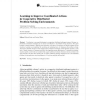Free Online Productivity Tools
i2Speak
i2Symbol
i2OCR
iTex2Img
iWeb2Print
iWeb2Shot
i2Type
iPdf2Split
iPdf2Merge
i2Bopomofo
i2Arabic
i2Style
i2Image
i2PDF
iLatex2Rtf
Sci2ools
152
click to vote
ML
1998
ACM
1998
ACM
Learning to Improve Coordinated Actions in Cooperative Distributed Problem-Solving Environments
Abstract. Coordination is an essential technique in cooperative, distributed multiagent systems. However, sophisticated coordination strategies are not always cost-effective in all problem-solving situations. This paper presents a learning method to identify what information will improve coordination in specific problem-solving situations. Learning is accomplished by recording and analyzing traces of inferences after problem solving. The analysis identifies situations where inappropriate coordination strategies caused redundant activities, or the lack of timely execution of important activities, thus degrading system performance. To remedy this problem, situation-specific control rules are created which acquire additional nonlocal information about activities in the agent networks and then select another plan or another scheduling strategy. Examples from a real distributed problem-solving application involving diagnosis of a local area network are described.
Coordination Strategies | Machine Learning | ML 1998 | Problem-solving Situations | Specific Problem-solving Situations |
Related Content
| Added | 22 Dec 2010 |
| Updated | 22 Dec 2010 |
| Type | Journal |
| Year | 1998 |
| Where | ML |
| Authors | Toshiharu Sugawara, Victor R. Lesser |
Comments (0)

